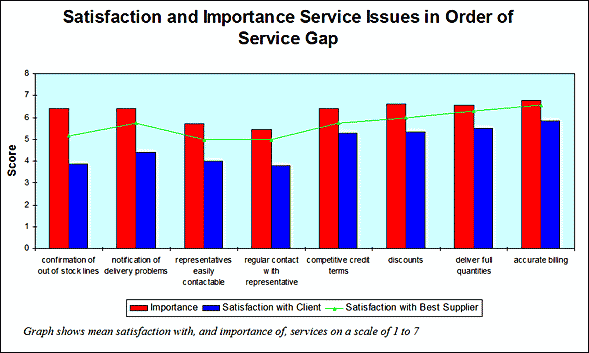Pharma Study 1: Syndicated Supply Chain - Biennial Tracker
We have undertaken a biennial syndicated UK supply chain study since 2003 that identifies the needs of hospitals, independent pharmacists and dispensing doctor practices. We routinely measure their satisfaction with manufactures, 3PLs and Homecare providers. A number of pharmaceutical companies use our yearly results to help assess how effectively they are performing verses other manufacturers. This survey is a cost-effective way of understanding the needs of the supply chain. Over the last few years the survey has covered many topics including:
· Satisfaction with manufacturer performance
· EDI
· Satisfaction with wholesaler/carrier performance
· The impact of stockouts
· The importance of 10 key service factors
· The preference for direct deliveries or wholesaler deliveries (Hospitals)
Conclusion: The survey has been popular with a number of manufacturers and helped them to restructure their processes, deliver a better service and produce cost savings.
Pharma Study 2: New Agency/DTP Scheme Research
We undertook research to test the perceptions of wholesalers, hospitals, and retail pharmacies for a new agency scheme. This included an examination of preferences for new carriers, delivery frequency and alternative methods of discounting.
It also included perceptions about an existing agency scheme from both a both financial and process perspective.
In undertaking the study we helped our clients to understand how elements of a new scheme would affect the supply chain and how acceptable they would be to customers.
Conclusion: Our clients were able use the customer perceptions in their decision to launch an agency/DTP scheme and what form it should take.
Pharma Study 3: Cold Chain Deliveries to Hospitals
Our pharmaceutical-manufacturing client wished to understand whether hospitals would prefer direct deliveries or wholesaler deliveries for a number of their cold-chain products.
We set about creating a questionnaire that would identify the problems they experienced with direct and wholesaler cold-chain deliveries.
We then asked them to express a preference for either and why.
We then asked them whether they would strongly object to either.
Conclusion: Our clients used the results to restructure their hospital deliveries and ultimately improve the service provided to hospitals and patients.
Pharma Study 4: Generics Scheme - Customer Requirements Analysis
A pharmaceutical company wished to know what value their customers attached to various service elements when buying generic products. We designed a study that tested a number of service issues with independent pharmacists via qualitative telephone interviews. We identified a number of core service elements and tested these via quantitative telephone interviews. We used 'trade-off' analysis to find out if pharmacists had a preference for either one service element or another. Within the service element trade-offs we were able to test a price discount.
At the end of the study we were able to show the client the service elements that were valued more than the price discount and those service elements that were not (in rank order). We would not have been able to demonstrate this so convincingly had we used less sophisticated research techniques.
We were also able to show the client how price sensitivity differed between their customers' categories.
Conclusion: As core differences between their larger, medium and smaller accounts were established, the client was able to realign their pricing strategy to maximise profitability.
Pharma Study 5: Key Customers - Satisfaction & Requirements Analysis
A pharmaceutical company wished to know which service elements their key account customers (business to business) wanted when buying ethical pharmaceutical products. We designed a study that tested a number of service issues with these key accounts. A number of key wholesale, multiple retail and hospital customers were interviewed.
The purpose of the study was to find out what the customers expected and how the client was performing against these measures. We also wished to find out where the client was under-delivering and over-delivering on its service elements. At the end of the study we were able to demonstrate to the client which areas they should improve and how this information could be used to enhance their supply chain strategy.
Conclusion: There were findings that enabled the client to reduce their service costs to some customer groups. One of the recommendations resulted in a saving of £40,000 a year to the supply chain costs.

Pharma Study 6: Syndicated Stock Availability Research
In 2011 we created a study that allowed pharmacos to benchmark their performance of products that are frequently exported from the UK. It is vital that these stocks are managed well to prevent excessive delays occuring for pharmacists and patients.
The results of the survey has allowed a number of pharmacos to assess their relative performance in stock delays versus their competitors. In some cases, the results have been used to evidence a good or reasonable performance to internal and external stakeholders. This has supported key decisions such as whether to amend stock allocations and/or distribution processes.

